

On April 10th, School of Environmental Science and Engineering (SESE) sub-forum of South China University of Technology "Excellent Young Scholars At Home and Abroad Forum" was held successfully in the B4-308 conference room in University City campus. The sub-forum invited a lot of overseas youth scholars to make academic report, such as Dr. Chen Peirong from RWTH Aachen in Germany, Dr. Dong Yiran from the University of Illinois at Urbana-Champaign, Dr. Wang Qilin from the Griffith University in Australia and Dr. Zhao Lijuan from University of California at Santa Barbara, USA. Person in charge of SESE, teachers and students from related major participated in the sub-forum.
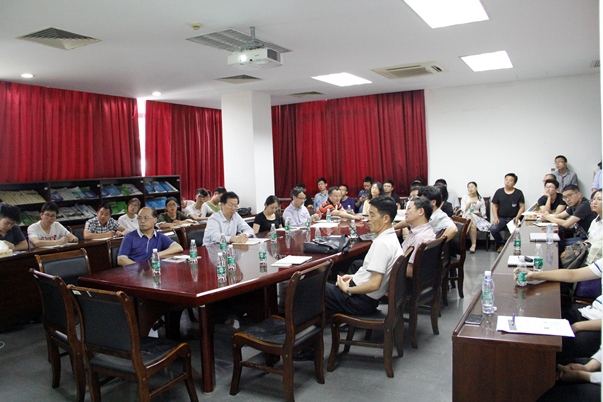
Firstly, Dr. Chen Peirong made an academic report on the theme "Mechanistic understanding of DeNOx by NH3-SCR over Cu- / Fe-exchanged zeolite catalysts", introduced some progress in the study of copper / iron molecular sieve Low-temperature NH3-SCR reaction combined with in-situ spectroscopy, reaction kinetics and DFT theory.
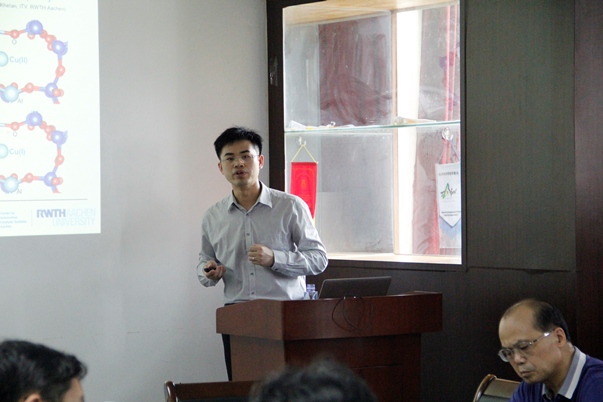
And then, Dr. Dong Yiran made an academic report on the theme of "Stable pH Condition Sustained by a Fermentative Iron-reducing Bacterium, Orenia metallireducens Strain Z6". The report discussed bioremediation mechanism of environmental pollutants and adaptive evolution mechanism of natural environment, which provided scientific support for the understanding of the interaction between microbes and natural, human factors and the development of effective pollution remediation, monitoring and management methods.
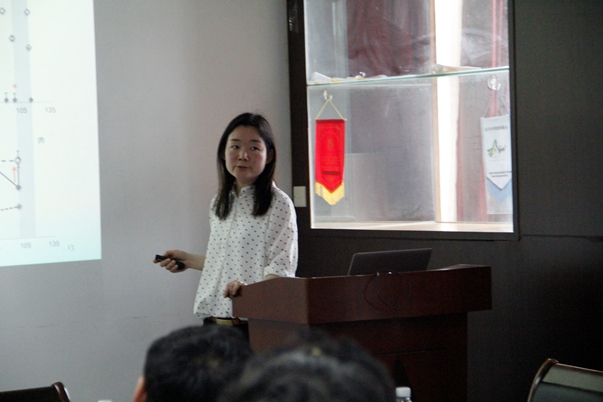
Then, Dr. Wang Qilin conducted an academic report on the theme "Free nitrite-treated sludge to achieve energy self-contained sewage treatment." The report pointed out that although the current sewage treatment plant uses anaerobic digestion to recycle the energy in the sewage, the energy recycling rate is only about 5-7% of the energy in the sewage. The study showed that the treatment of sludge through free nitrite can improve the energy recycling rate in the sewage, so that the sewage treatment process can turn into a process of self-sufficient energy.
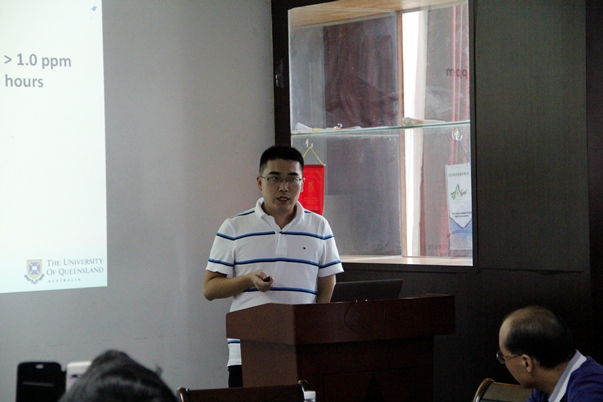
Finally, Dr. Zhao Lijuan gave a academic report on the theme of "Metabolomics: A Powerful Tool to Detect Response of Crop Plants to Nanoparticles at Molecular Level". Study on the effect of nano pesticides on environment and agriculture and the metabolomics platform based on GC-TOF- MS, advanced the study of Nano-toxicity of plant to molecular level. Through the detection of content changes of hundreds of metabolites, a comprehensive and systematic understanding of the changes in plants under the stress of nanoparticles at the molecular level has great importance to reveal its defense mechanism and antitoxic mechanism.
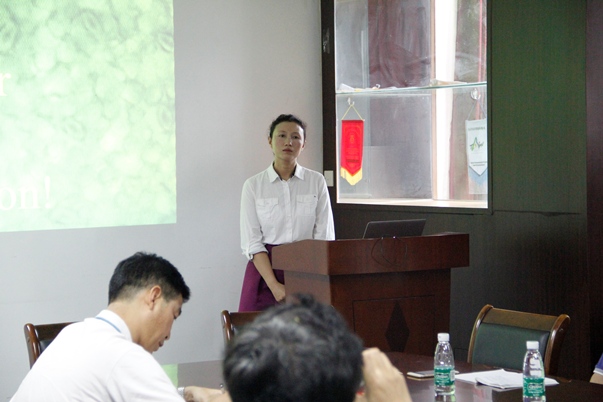
The whole forum was full of strong academic atmosphere. The present teachers and students conducted a further communication and discussion with the reporter in their own interested research direction and problems. And the atmosphere on the spot is very active. Through this platform, we can understand the latest research results and research trends in the field of research, reflecting the latest research developments in these areas.
It is reported that South China University of Technology "Excellent Young Scholars At Home and Abroad Forum" aims to invite young people at home and abroad, to communicate and discuss around frontier and hot areas of the international scientific research, as well as key technical issues in the industry, which greatly help inspire each other, broaden horizons and promote international exchanges and cooperation.
Additional Introduction:
Chen Peirong:
He studied a doctor's degree at the lab of Prof. Martin Muhler (now Chairman of the German Society of Catalysis) at the Ruhr-Universität Bochum, Germany, from 2013 to 2013. During this period he participated in the research project CarboKat of the German Ministry of Education and Research (BMBF) and Bayer (Bayer). As the hard core of the project, he cooperated with International Max Planck Research School, Fritz-Haber Institute, Bayer AG and Clariant AG, carried out an in-depth study on the basic theory and process engineering of carbon nanotube industrial catalysis, and made some important achievements in the fields of selective hydrogenation and photocatalytic hydrolysis of hydrogen. At the end of 2013, he joined Professor Ulrich Simon’s research project at the Institute of inorganic chemistry of RWTH Aachen. He collaborated with Professor Ralf Moos of the Bayreuth University to work on the catalytic purification of motor vehicle exhaust and the sensor for On-Board Diagnostics. At the same time, he worked at Aachen Automotive Catalytic Systems Research Center, cooperated with Internal Combustion Engine, Combustion Institute, Industrial Catalysis Institute, Electron Microscope Center, Yu Lixi Research Center, Ford Aachen R & D Center at RWTH Aachen, to develop a new emission standards aimed at tail gas (Post Euro IV Standard) and the catalytic purification technology and systems of real-driving emission test. He has made important progress in the field of Selective catalytic reduction (NH3-SCR) denitrification technology, NOx storage / reduction (NSR) denitrification technology, NSR / SCR mixed denitrification technology, SCR and NSR reaction in situ spectra, the catalyst at the same time as a sensor. So far, He has published 20 papers in ACS, J., Catal. and other important international academic journals, among which there were 13 papers he named as first authors, 7 as corresponding author, and 15 papers’ influencing factors were more than 4. He has been invited to write two reviews and do the report in the international academic conference for five times.
Dong Yiran:
Main research direction: 1) Microbial transformation and ecological restoration of groundwater and soil contaminants; 2) Biogeochemistry; 3) Effects of human microbial colonies on human health. She has formed a microbial environment research system, which makes Functional microorganism as the main factor, metagenomics, metatranscriptomics, metaproteomics and bioinformatics as the main means of research, combined with experimental and large data technology for micro-organisms and macro-natural or engineering system as research background. She explored the mechanisms of bioremediation of environmental pollutants and the adaptive mechanisms of biology to the natural environment, providing scientific support for understanding the interaction of microbes with natural and human factors and developing effective pollution remediation, monitoring and management methods. Served as the first author and corresponding author, She has published 18 papers, 1 chapter in English works, Chinese monographs of the 1 and the patent of the 3, in Environmental Science & Technology, Environmental Microbiology, Applied and Environmental Microbiology, Frontiers in Microbiology and other international authoritative mainstream environmental science and environmental microbiology journals. She has been invited to report on various international conferences and presided over the international conference as a co-chair, as a guest reviewer for 12 journals including Environmental Science & Technology, Environmental Microbiology, Applied and Environmental Microbiology. Her work was reported by NASA and other media.
Wang Qilin:
He published 50 papers in SCI, of which there are 22 papers he is named as first/ corresponding author. In the past five years, he published 45 SCI papers, of which there are 22 papers he is named as the first / corresponding author ; as Principal Investigator ,he received a total of six projects, with a total funding of approximately 3.5 million Australian dollars, including the ARC DECRA project (national project, equivalent to the National Outstanding Youth Fund, which is only 1-2 people per year in the Australian environmental engineering sector), ARC DP project (national project, the only project in the field of environmental engineering in Australia in 2016), the ARC DR project (national project, the only funded project in the field of environmental engineering in Australia in 2016), Queensland Government projects, etc. The technology of free nitrous acid published during his doctoral period is being industrialized by Uniquest all over the world.
Zhao Lijuan:
She mainly devoted herself to the study of the environmental impact of new nano-materials, focusing on the study of the migration, transformation, the accumulation of crops in the biological and toxicological of nano-materials in a variety of environmental conditions. The applicant's research has been at the leading peer level in the field of nano plant interactions. She first tried to explore crops’ metabolic responses to engineering nanoparticles or nanometer pesticides at the molecular level, using NMR-based and GC-TOF-MS metabolomics. Her important research results include the first disclosure of copper-containing nano-pesticides in the plant to stimulate the antioxidant defense system, reducing non-enzyme small molecule antioxidant content. Related research results have been published in the ACS Nano, Environmental Science Nano, Environmental Science & Technology, PNAS, Journal of Agricultural and Food Chemistry and other world-class academic journals, and she has been recognized by peer scholars. As of March 2017, she has published 32 papers in the International SCI Journal, of which there are 7 articles in one district (another two articles are in the review stage), 18 articles for which she served as the first or the corresponding author (three in the review stage), 1 cover article. All her articles have been quoted by google scholar for total 1431 times, H-index for 20 times.




